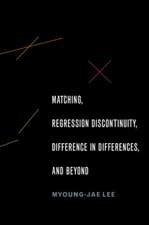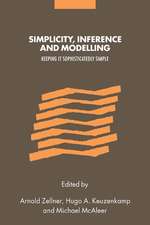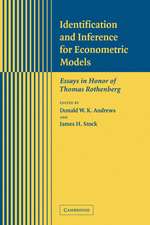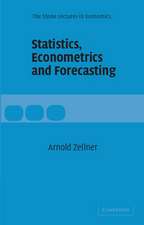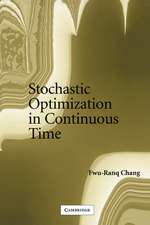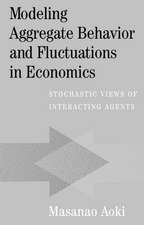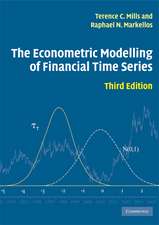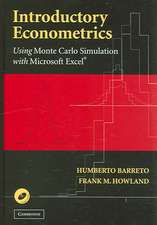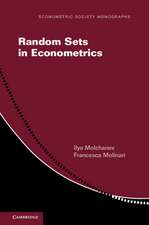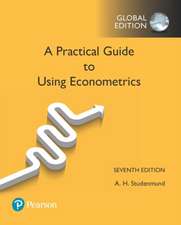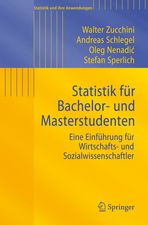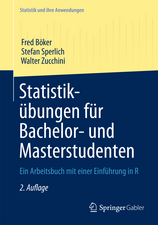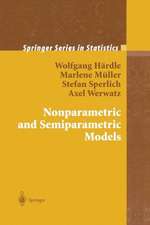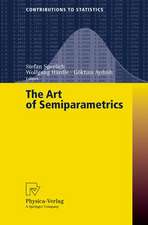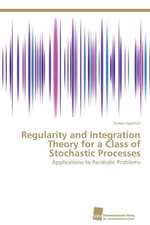Impact Evaluation: Treatment Effects and Causal Analysis
Autor Markus Frölich, Stefan Sperlichen Limba Engleză Paperback – 20 mar 2019
| Toate formatele și edițiile | Preț | Express |
|---|---|---|
| Paperback (1) | 336.55 lei 6-8 săpt. | |
| Cambridge University Press – 20 mar 2019 | 336.55 lei 6-8 săpt. | |
| Hardback (1) | 801.45 lei 6-8 săpt. | |
| Cambridge University Press – 20 mar 2019 | 801.45 lei 6-8 săpt. |
Preț: 336.55 lei
Nou
Puncte Express: 505
Preț estimativ în valută:
64.41€ • 69.94$ • 54.10£
64.41€ • 69.94$ • 54.10£
Carte tipărită la comandă
Livrare economică 22 aprilie-06 mai
Preluare comenzi: 021 569.72.76
Specificații
ISBN-13: 9781107616066
ISBN-10: 1107616069
Pagini: 428
Ilustrații: 73 b/w illus.
Dimensiuni: 173 x 246 x 20 mm
Greutate: 0.86 kg
Editura: Cambridge University Press
Colecția Cambridge University Press
Locul publicării:New York, United States
ISBN-10: 1107616069
Pagini: 428
Ilustrații: 73 b/w illus.
Dimensiuni: 173 x 246 x 20 mm
Greutate: 0.86 kg
Editura: Cambridge University Press
Colecția Cambridge University Press
Locul publicării:New York, United States
Cuprins
1. Basic definitions, assumptions, and randomized experiments; 2. An introduction to nonparametric identification and estimation; 3. Selection on observables: matching, regression and propensity score estimators; 4. Selection on unobservables: nonparametric IV and structural equation approaches; 5. Difference-in-differences estimation: selection on observables and unobservables; 6. Regression discontinuity design; 7. Distributional policy analysis and quantile treatment effects; 8. Dynamic treatment evaluation.
Recenzii
'This comprehensive book on impact evaluation provides a long awaited state-of-the-art treatment of the econometric and statistical tools used for impact evaluation in economics and neighboring social sciences. What makes this most useful is the combination of rigorous discussion of the key methodological aspects, so that the tools do not remain a black box, with careful discussions of identification and illustrations of applications. This book will be a quintessential tool both for practitioners and scholars in the field.' Bernd Fitzenberger, Humboldt-Universität zu Berlin and the Centre for European Economic Research (ZEW), Germany
'This book is an excellent contribution to the literature on treatment effect. All the concepts are clearly defined in a rigorous mathematical framework. Both parametric and non-parametric estimation are treated and numerous examples illustrate the presentation. I strongly recommend this book as a course support and as a reference for researchers on theory or applications of treatment effects models.' Jean-Pierre Florens, École d'économie de Toulouse
'Comprehensive summary of the recent classical microeconometric evaluation literature. With its focus on intuition as well as rigour, it is a long awaited reference for the applied and the methodinterested researcher and teacher.' Michael Lechner, Universität St Gallen, Switzerland
'The authors are to be congratulated for their comprehensive and delightfully modern treatment of causal inference based on observational data. This book spans the most promising approaches towards impact evaluation, and I am particularly impressed by their inclusion of Pearl's (2000) work alongside many other notable contributions. The emphasis on nonparametric identification and semiparametric and nonparametric estimation makes this text standout. It deserves to be on the bookshelves of all Econometricians who wish to keep abreast of this exciting and rapidly growing field.' Jeffery Racine, McMaster University, Ontario
'This book is extremely useful for anyone who wants to learn (more) about the field of quantitative impact evaluation in social sciences. Apart from providing a rigourous treatment of both identification and estimation, the authors are to be commended for clearly stating the assumptions behind the various methods, and also for cautioning against limitations in practical applications. A further benefit of the book is the introduction of causal graphs for impact evaluation in econometrics. In sum, a highly recommended book that surely will have a significant impact.' Michael Wolf, Universität Zürich
'This book is an excellent contribution to the literature on treatment effect. All the concepts are clearly defined in a rigorous mathematical framework. Both parametric and non-parametric estimation are treated and numerous examples illustrate the presentation. I strongly recommend this book as a course support and as a reference for researchers on theory or applications of treatment effects models.' Jean-Pierre Florens, École d'économie de Toulouse
'Comprehensive summary of the recent classical microeconometric evaluation literature. With its focus on intuition as well as rigour, it is a long awaited reference for the applied and the methodinterested researcher and teacher.' Michael Lechner, Universität St Gallen, Switzerland
'The authors are to be congratulated for their comprehensive and delightfully modern treatment of causal inference based on observational data. This book spans the most promising approaches towards impact evaluation, and I am particularly impressed by their inclusion of Pearl's (2000) work alongside many other notable contributions. The emphasis on nonparametric identification and semiparametric and nonparametric estimation makes this text standout. It deserves to be on the bookshelves of all Econometricians who wish to keep abreast of this exciting and rapidly growing field.' Jeffery Racine, McMaster University, Ontario
'This book is extremely useful for anyone who wants to learn (more) about the field of quantitative impact evaluation in social sciences. Apart from providing a rigourous treatment of both identification and estimation, the authors are to be commended for clearly stating the assumptions behind the various methods, and also for cautioning against limitations in practical applications. A further benefit of the book is the introduction of causal graphs for impact evaluation in econometrics. In sum, a highly recommended book that surely will have a significant impact.' Michael Wolf, Universität Zürich
Notă biografică
Descriere
Encompasses the main concepts and approaches of quantitative impact evaluations, used to consider the effectiveness of programmes, policies, projects or interventions.

